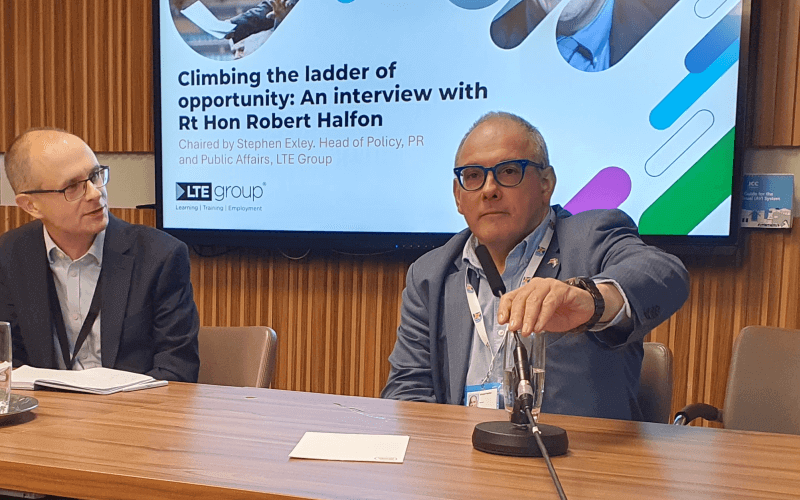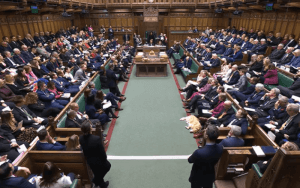One of the few disabled MPs in the last parliament has called for significant access improvements to the House of Commons.
Robert Halfon, who was Conservative MP for Harlow for 14 years and served as an education minister, stepped down before July’s election.
He told Disability News Service (DNS) on Tuesday that although Commons staff were “the most lovely people you’ll ever meet”, the facilities were “appalling”.
Speaking at a fringe meeting hosted by LTE Group at the Conservative party conference in Birmingham, Halfon (pictured, right) said “the lifts always break”, while “the loos are always broken and then they take weeks to fix them… weeks and weeks and weeks”.
Halfon, who has a mobility impairment, said the doors in the Palace of Westminster are “always shut”, while non-disabled people frequently use the accessible toilets.
He said the Commons was “both the best place and the worst place”, because of the “wonderful staff” but “appalling” facilities.
DNS had asked him about figures obtained through a freedom of information request from the House of Commons that showed 43 out of the 650 MPs had discussed the possibility of having disability-related adjustments made for them, after every MP was approached with an offer of support by Commons authorities when they were elected in July.
Halfon said he believed the figures showed that the system of support for disabled MPs was now “working properly”.
Other than supportive staff, and an office near the Commons division lobby, he said he was offered “nothing” by way of adjustments when he became an MP in 2010.
It was not until 2017 that he saw an advert for a four-wheel upright scooter, the RollerScoot, which allowed him to travel around the parliamentary estate much more easily and which he said “changed my life”, because “walking around the Commons is like walking round a football pitch 10 times over”.
He said: “If I’d had that from the beginning, I think it would have been a huge difference, but no-one suggested it. I didn’t even know they existed. No one had asked me.”
He said in his final speech in parliament in May that the House of Commons is “a terrible place for people who have difficulties”.
He told MPs: “There is just not enough understanding.
“Everybody should be able to access this place easily and comfortably, whatever their background, so I urge the new parliament, you, Mr Deputy Speaker, Mr Speaker and the other Deputy Speakers to make that happen once and for all.”
Halfon, who had two spells as an education minister, and also chaired the education select committee, focused for much of his time in parliament on championing apprenticeships and skills.
He was the first MP to employ an apprentice in his parliamentary office, and eventually took on six.
He said his party had brought about “an apprenticeship and skills revolution in our country”, where there were now apprenticeships in more than 70 per cent of occupations, including degree-level apprenticeships.
He said he had not yet decided who to vote for in the Conservative leadership election.
Halfon said the problems with his party were “one, that people don’t know what our values are; two, they don’t trust us; and three, that we are not seen as a social justice party”.
A note from the editor:
Please consider making a voluntary financial contribution to support the work of DNS and allow it to continue producing independent, carefully-researched news stories that focus on the lives and rights of disabled people and their user-led organisations.
Please do not contribute if you cannot afford to do so, and please note that DNS is not a charity. It is run and owned by disabled journalist John Pring and has been from its launch in April 2009.
Thank you for anything you can do to support the work of DNS…

 Majority of disabled MPs voted against assisted suicide bill, figures show
Majority of disabled MPs voted against assisted suicide bill, figures show Research shows how transport bodies could add accessibility into vital planning tool
Research shows how transport bodies could add accessibility into vital planning tool Labour silence over PM’s work search comments, as Tory ex-DWP minister says: ‘You’d never have heard that from me’
Labour silence over PM’s work search comments, as Tory ex-DWP minister says: ‘You’d never have heard that from me’